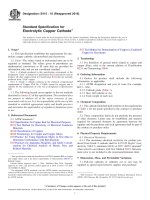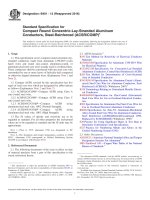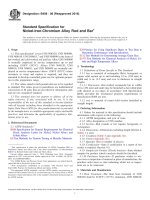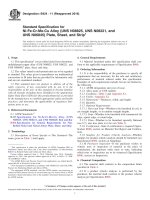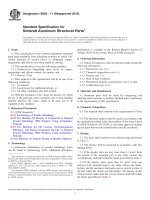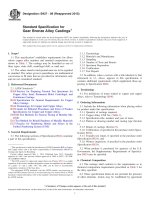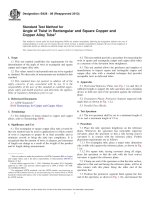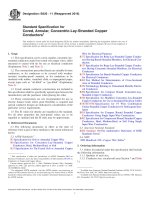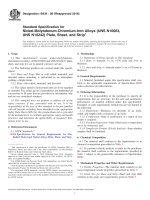Astm b 369 09 (2016)
Bạn đang xem bản rút gọn của tài liệu. Xem và tải ngay bản đầy đủ của tài liệu tại đây (115.36 KB, 5 trang )
Designation: B369 − 09 (Reapproved 2016)
Standard Specification for
Copper-Nickel Alloy Castings1
This standard is issued under the fixed designation B369; the number immediately following the designation indicates the year of
original adoption or, in the case of revision, the year of last revision. A number in parentheses indicates the year of last reapproval. A
superscript epsilon (´) indicates an editorial change since the last revision or reapproval.
This standard has been approved for use by agencies of the U.S. Department of Defense.
1. Scope*
2. Referenced Documents
2.1 ASTM Standards:3
B208 Practice for Preparing Tension Test Specimens for
Copper Alloy Sand, Permanent Mold, Centrifugal, and
Continuous Castings
B824 Specification for General Requirements for Copper
Alloy Castings
B846 Terminology for Copper and Copper Alloys
E527 Practice for Numbering Metals and Alloys in the
Unified Numbering System (UNS)
2.2 ASME Code:4
ASME Boiler and Pressure Vessel Code
2.3 AWS Standard:5
AWS A5.6 Specification for Copper and Copper-Alloy ArcWelding Electrodes
1.1 This specification establishes the requirements for
copper-nickel alloy castings with nominal compositions shown
in Table 1. These are as follows:2
Copper Alloy UNS No.2
Previous Designation
C96200
C96400
Alloy A
Alloy B
1.2 Castings of these alloys are used primarily for
corrosion-resistance applications such as in construction and
for pressure vessels, particularly in marine pumps, valves, and
fittings.
1.3 These alloys are considered weldable, but they may be
ordered with a weld test to ensure weldability. When extensive
welding is to be performed on the casting, weldability tests
should be specified in the ordering information (5.2.6) to
ensure proper welding characteristics.
3. General Requirements
3.1 The following sections of Specification B824 form a
part of this specification. In the event of a conflict between this
specification and Specification B824, the requirements of this
specification shall take precedence.
3.1.1 Terminology (Section 3),
3.1.2 Other Requirements (Section 7),
3.1.3 Dimensions, Mass, and Permissible Variations (Section 8),
3.1.4 Workmanship, Finish, and Appearance (Section 9),
3.1.5 Sampling (Section 10),
3.1.6 Number of Tests and Retests (Section 11),
3.1.7 Specimen Preparation (Section 12),
3.1.8 Test Methods (Section 13),
3.1.9 Significance of Numerical Limits (Section 14),
1.4 Units—The values stated in inch-pound units are to be
regarded as standard. The values given in parentheses are
mathematical conversions to SI units that are provided for
information only and are not considered standard.
1.5 The following hazard statement applies only to Section
8, Weldability Test, of this specification. This standard does not
purport to address all of the safety concerns, if any, associated
with its use. It is the responsibility of the user of this standard
to establish appropriate safety and health practices and
determine the applicability of regulatory limitations prior to
use.
1
This specification is under the jurisdiction of ASTM Committee B05 on Copper
and Copper Alloys and is the direct responsibility of Subcommittee B05.05 on
Castings and Ingots for Remelting.
Current edition approved April 1, 2016. Published May 2016. Originally
approved in 1961. Last previous edition approved in 2009 as B369 – 09. DOI:
10.1520/B0369-09R16.
2
The UNS system for copper and copper alloys (see Practice E527) is a simple
expansion of the former standard designation system accomplished by the addition
of a prefix “C” and a suffix “00”. The suffix can be used to accommodate
composition variations of the base alloy.
3
For referenced ASTM standards, visit the ASTM website, www.astm.org, or
contact ASTM Customer Service at For Annual Book of ASTM
Standards volume information, refer to the standard’s Document Summary page on
the ASTM website.
4
Available from American Society of Mechanical Engineers (ASME), ASME
International Headquarters, Two Park Ave., New York, NY 10016-5990, http://
www.asme.org.
5
Available from American Welding Society (AWS), 8669 NW 36 St., #130,
Miami, FL 33166-6672, .
*A Summary of Changes section appears at the end of this standard
Copyright © ASTM International, 100 Barr Harbor Drive, PO Box C700, West Conshohocken, PA 19428-2959. United States
1
B369 − 09 (2016)
TABLE 1 Nominal Compositions
Composition, %
Copper Alloy UNS No.
Copper
87.5
67.0
C96200
C96400
3.1.10
3.1.11
3.1.12
3.1.13
3.1.14
3.1.15
Nickel
10.0
30.0
Iron
1.5
0.7
6.2 These specification limits do not preclude the presence
of other elements. Limits may be established and analysis
required for unnamed elements agreed upon between the
manufacturer or supplier and the purchaser. Copper may be
given as remainder and may be taken as the difference between
the sum of all elements analyzed and 100 %. When all the
elements in the table are analyzed, their sum shall be 99.5 %
minimum.
4.1 For definitions of terms relating to copper alloys, refer to
Terminology B846.
5. Ordering Information
5.1 Orders for castings under this specification should
include the following information:
5.1.1 Specification title, number, and year of issue;
5.1.2 Quantity of castings;
5.1.3 Copper Alloy UNS Number (Table 2);
5.1.4 Pattern or drawing number and condition (as-cast,
machined, and so forth);
5.1.5 ASME Boiler and Pressure Vessel Code Requirements
(Section 12); and
5.1.6 When material is purchased for agencies of the U.S.
Government, the Supplementary Requirements of this specification may be specified.
7. Mechanical Properties
7.1 Mechanical properties shall be determined from separately cast test bar castings, and shall meet the requirements
shown in Table 3.
8. Weldability Test
8.1 When specified in the purchase order at least one test
cast as shown in Fig. 1 shall be prepared for each lot of welding
grade castings (5.2.6).
8.2 The block shall be molded, gated, and risered in such a
manner to produce a sound casting without defects that might
interfere with welding or the interpretation of the results of the
test.
5.2 The following are optional and should be specified in
the purchase order when required:
5.2.1 Pressure test or soundness requirements (Specification
B824);
5.2.2 Witness inspection (Specification B824);
5.2.3 Certification (Specification B824);
5.2.4 Foundry test report (Specification B824);
5.2.5 Product marking (Specification B824);
5.2.6 Weldability test (1.3, Section 8, and Table 2); and
5.2.7 Approval of weld procedure and records of repairs
(Section 9).
8.3 The groove in the test block shall be completely filled
with weld deposit metal, using the manual metallic-arc process
with 1⁄8-in. (12.7-mm) or 5⁄32-in. (3.97-mm) diameter coppernickel (70-30) coated electrodes conforming to classification
AWS ECuNi of AWS Specification A5.6. The interpass temperature need not be controlled, unless it is to be controlled in
fabrication.
8.4 One 3⁄8-in. (9.52-mm) minimum thick bend coupon (see
Fig. 2), shall be removed longitudinally from the center of the
welded block by machining, sawing, abrasive cutting, or other
suitable means. Cut surfaces and edges should be sanded
smooth if necessary. The side bend specimen then shall be bent
180° in a guided bend jig around a mandrel 11⁄2 in. (38.1 mm)
in diameter with the weld located at the center of the bend.
TABLE 2 Chemical Requirements
Copper
Lead
Iron
Nickel, incl cobalt
Manganese
Silicon
Niobium
Phosphorus
Sulfur
Carbon
Min, %
Min, %
Max, %
balance
...
1.0
9.0
...
...
...
...
...
...
Max, %
balance
0.01
1.8
11.0
1.5
0.50
1.0A
0.02
0.02
0.10
...
0.25
28.0
...
...
0.50
...
...
...
Niobium
...
1.0
6.1 The castings shall conform to the chemical requirements
shown in Table 2 for the copper alloy UNS numbers specified
in the purchase order.
4. Terminology
Copper Alloy UNS No.
C96400
Manganese
0.9
0.8
6. Chemical Composition
Inspection (Section 15),
Rejection and Rehearing (Section 16),
Certification (Section 17),
Test Report (Section 18),
Product Marking (Section 19), and
Packaging and Package Marking (Section 20).
Copper Alloy UNS No.
C96200
Silicon
0.1
0.5
0.01
1.5
32.0
1.5
0.50
1.5
0.02
0.02
0.15
TABLE 3 Mechanical Requirements
Tensile strength, min, ksiA (MPa)
Yield strength,B min, ksiA (MPa)
Elongation in 2 in. (50.8 mm), %
A
Copper Alloy
UNS No. C96200
Copper Alloy
UNS No. C96400
45 (310)
25 (170)
20
60 (415)
32 (220)
20
ksi = 1000 psi.
Yield strength shall be determined as the stress producing an elongation under
load of 0.5 %, that is 0.01 in. (0.254 mm) in a gage length of 2 in. (50.8 mm).
A
B
When product or casting is intended for subsequent welding applications, and so
specified by the purchaser, the niobium content shall be 0.40 % max.
2
B369 − 09 (2016)
TABLE 4 Metric Conversion Values for Figs. 1 and 2
in.
(mm)
in.
(mm)
⁄
⁄
3⁄ 4
1
1 1 ⁄8
(3.18)
(9.52)
(19.0)
(25.4)
(28.6)
13⁄4
23⁄4
3
31⁄2
6
(44.4)
(69.8)
(76.2)
(88.9)
(152)
18
38
9.2 Excavations that exceed those described in 9.1 may be
made at the manufacturer’s discretion except that when specified in the purchase order (5.2.7) the weld procedure shall be
approved by the purchaser and the following record shall be
maintained:
9.2.1 A sketch or drawing showing the dimensions, depth,
and location of excavations;
9.2.2 Post weld heat treatment, when applicable;
9.2.3 Weld repair inspection results;
9.2.4 Casting identification number;
9.2.5 Weld procedure identification number;
9.2.6 Welder identification; and
9.2.7 Name of inspector.
9.3 The castings shall not be impregnated without approval
of the purchaser.
10. Sampling
10.1 Test bar castings for tension testing of the copper alloy
UNS numbers in this specification shall be cast to the form and
dimensions shown in Fig. 1 or Fig. 2 of Practice B208.
NOTE 1—For metric equivalents see Table 4.
FIG. 1 Cast Block for Weldability Test
11. Test Methods
11.1 Analytical chemical methods are given in Specification
B824.
11.1.1 Test methods to be followed for the determination of
elements resulting from contractual or purchase order agreement shall be as agreed upon between the manufacturer or
supplier and the purchaser.
12. ASME Requirements
12.1 When specified in the purchase order to meet ASME
Boiler and Pressure Vessel Code requirements, castings of
Copper Alloy UNS No. C96200 shall comply with the following:
12.1.1 Certification requirements of Specification B824.
12.1.2 Foundry test report requirements of Specification
B824.
12.1.3 Castings shall be marked with the manufacturer’s
name, the copper alloy UNS number, and the casting quality
factor. In addition, heat numbers or serial numbers that are
traceable to heat numbers shall be marked on all pressurecontaining castings individually weighing 50 lb (22.7 kg) or
more. Pressure-containing castings weighing less than 50 lb
(22.7 kg) shall be marked with either the heat number or a
serial number that will identify the casting as to the month in
which it was poured. Marking shall be in such a position as to
not injure the usefulness of the casting.
NOTE 1—For metric equivalents see Table 4.
FIG. 2 Weldability Test Block
8.5 Cracks or other open defects exceeding 1⁄8 in. (3.2 mm)
measured in any direction in the fusion zone or heat-affected
zone on the convex surface of the specimen after bending shall
be cause for rejection. Cracks originating at weld-bead
undercuts, at weld-slag inclusions, or at casting defects shall
not be cause for rejection.
9. Casting Repair
9.1 Alloys included in this specification are generally weldable. Weld repairs may be made at the manufacturer’s discretion provided each excavation does not exceed 20 % of the
casting section or wall thickness or 4 % of the casting surface
area.
13. Keywords
13.1 copper-alloy castings; copper-nickel castings; UNS
No. C96200; UNS No. C96400
3
B369 − 09 (2016)
SUPPLEMENTARY REQUIREMENTS
The following supplementary requirements shall apply only when specified by the purchaser in the
inquiry, contract, or order, for agencies of the U.S. government.
S5. Quality Assurance
S5.1 Responsibility for Inspection:
S5.1.1 Unless otherwise specified in the contract or purchase order, the manufacturer is responsible for the performance of all inspection and test requirements specified. Except
as otherwise specified in the contract or purchase order, the
manufacturer may use his own or any other suitable facilities
for the performance of the inspection and test requirements
unless disapproved by the purchaser at the time the order is
placed. The purchaser shall have the right to perform any of the
inspections or tests set forth when such inspections and tests
are deemed necessary to ensure that the material conforms to
prescribed requirements.
S1. Referenced Documents
S1.1 The following documents of the issue in effect on date
of material purchase form a part of this specification to the
extent referenced herein:
S1.1.1 ASTM Standard:
B900 Practice for Packaging of Copper and Copper Alloy
Mill Products for U.S. Government Agencies
S1.1.12 Federal Standards:6
Fed. Std. No. 102 Preservation, Packaging, and Packing
Levels
Fed. Std. No. 123 Marking for Shipment (Civil Agencies)
Fed. Std. No. 185 Identification Marking of Copper and
Copper-Base Alloy Mill Products
S1.1.3 Military Standards: 6
MIL-STD-129 Marking for Shipment and Storage
MIL-STD-248 Welded and Brazing Procedure in Performance Qualification
MIL-STD-278 Welding and Casting Standard
S6. Product Marking
S6.1 The castings shall be permanently marked in accordance with MIL-STD-792 and include specification and alloy
number, pattern or drawing number, lot number, and manufacturer’s name or trademark.
S2. Soundness
S7. Preparation for Delivery
S7.1 Preservation, Packaging, and Packing:
S7.1.1 Military Agencies—The material shall be separated
by size, composition, grade, or class and shall be preserved and
packaged, Level A or C, packed, Level A, B, or C as specified
in the contract or purchase order, in accordance with the
requirements of Practice B900.
S7.1.2 Civil Agencies—The requirements of Fed. Std. No.
102 shall be referenced for definitions of the various levels of
packaging protection.
S7.2 Marking:
S7.2.1 Military Agencies—In addition to any special marking required by the contract or purchase order, marking for
shipment shall be in accordance with MIL-STD-129.
S7.2.2 Civil Agencies—In addition to any special marking
required by the contract or purchase order, marking for
shipment shall be in accordance with Fed. Std. No. 123.
S2.1 Castings shall meet the soundness requirements of
MIL-STD-278 for the category, sub-category, and criticality
level specified in the purchase order.
S3. Pressure Test
S3.1 Castings shall meet the pressure test requirements of
MIL-STD-278.
S4. Weld Repair
S4.1 All repair welding shall be in accordance with MILSTD-278 using welders and welding procedures qualified in
accordance with MIL-STD-248.
6
Available from DLA Document Services, Building 4/D, 700 Robbins Ave.,
Philadelphia, PA 19111-5094, .
SUMMARY OF CHANGES
Committee B05 has identified the location of selected changes to this standard since the last issue (B369 – 06)
that may impact the use of this standard. (Approved April 1, 2009.)
(2) Made some minor editorial modifications.
(1) Revised the document to re-order the position of the
General Requirements Section. This permits a more expedient
reference to tensile testing requirements and methods, and
reference to Specification B824 General Requirements.
4
B369 − 09 (2016)
ASTM International takes no position respecting the validity of any patent rights asserted in connection with any item mentioned
in this standard. Users of this standard are expressly advised that determination of the validity of any such patent rights, and the risk
of infringement of such rights, are entirely their own responsibility.
This standard is subject to revision at any time by the responsible technical committee and must be reviewed every five years and
if not revised, either reapproved or withdrawn. Your comments are invited either for revision of this standard or for additional standards
and should be addressed to ASTM International Headquarters. Your comments will receive careful consideration at a meeting of the
responsible technical committee, which you may attend. If you feel that your comments have not received a fair hearing you should
make your views known to the ASTM Committee on Standards, at the address shown below.
This standard is copyrighted by ASTM International, 100 Barr Harbor Drive, PO Box C700, West Conshohocken, PA 19428-2959,
United States. Individual reprints (single or multiple copies) of this standard may be obtained by contacting ASTM at the above
address or at 610-832-9585 (phone), 610-832-9555 (fax), or (e-mail); or through the ASTM website
(www.astm.org). Permission rights to photocopy the standard may also be secured from the Copyright Clearance Center, 222
Rosewood Drive, Danvers, MA 01923, Tel: (978) 646-2600; />
5
